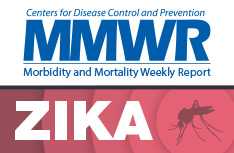Effects During Pregnancy
We expect that the course of Zika virus disease in pregnant women is similar to that in the general population. No evidence exists to suggest that pregnant women are more susceptible or experience more severe disease during pregnancy. It is not known if pregnant women are more susceptible to Guillain-Barré syndrome.
Microcephaly and Other Birth Defects
We know that Zika virus infection during pregnancy is a cause of congenital microcephaly and severe brain abnormalities. Zika virus has also been linked to other problems in pregnancies and among fetuses and infants infected before birth, such as miscarriage, stillbirth, and other birth defects.
A distinct pattern of birth defects, called congenital Zika syndrome, has emerged among fetuses and infants of women infected with Zika during pregnancy. In addition to cognitive, sensory, and motor disabilities that are shared with other birth defects, congenital Zika syndrome is associated with five types of birth defects that are either not seen or occur rarely with other infections (e.g., cytomegalovirus or rubella) during pregnancy:
- Severe microcephaly resulting in a partially collapsed skull
- Decreased brain tissue with brain damage (as indicated by a specific pattern of calcium deposits)
- Damage to the back of the eye with a specific pattern of scarring and increased pigment
- Limited range of joint motion, such as clubfoot
- Too much muscle tone restricting body movement soon after birth
Researchers are collecting data to better understand the extent to which Zika virus affects mothers and their children. Studies are underway to investigate the full spectrum of outcomes of Zika virus infection during pregnancy, including the role of other factors (e.g., prior or concurrent infections, nutrition, and environment) and the developmental effects of congenital infection.
Periconceptional Infection
There is limited information available about the risk of periconceptional Zika virus infection (defined as infection during 8 weeks before conception or 6 weeks before last menstrual period). Early case reports suggest there may be adverse outcomes associated with Zika virus infection in early pregnancy, including pregnancy loss and severe microcephaly. Information from other viral infections (e.g., cytomegalovirus) occurring around the time of conception indicate there are associations between periconceptional infections and adverse outcomes, although timing of infection and conception in these cases was often unknown.
More Information
- Vital Signs: Update on Zika Virus–Associated Birth Defects and Evaluation of All U.S. Infants with Congenital Zika Virus Exposure — U.S. Zika Pregnancy Registry, 2016 (MMWR, 2017)
- Vital Signs: Protecting Pregnant Women and Babies (April 2017)
- Zika virus and birth defects – Reviewing the evidence for causality (NEJM, 2016)
- Projecting Month of Birth for At-Risk Infants after Zika Virus Disease Outbreaks (EID, May 2016)
- MMWR Zika Reports
- Page last reviewed: July 21, 2017
- Page last updated: July 21, 2017
- Content source:





 ShareCompartir
ShareCompartir